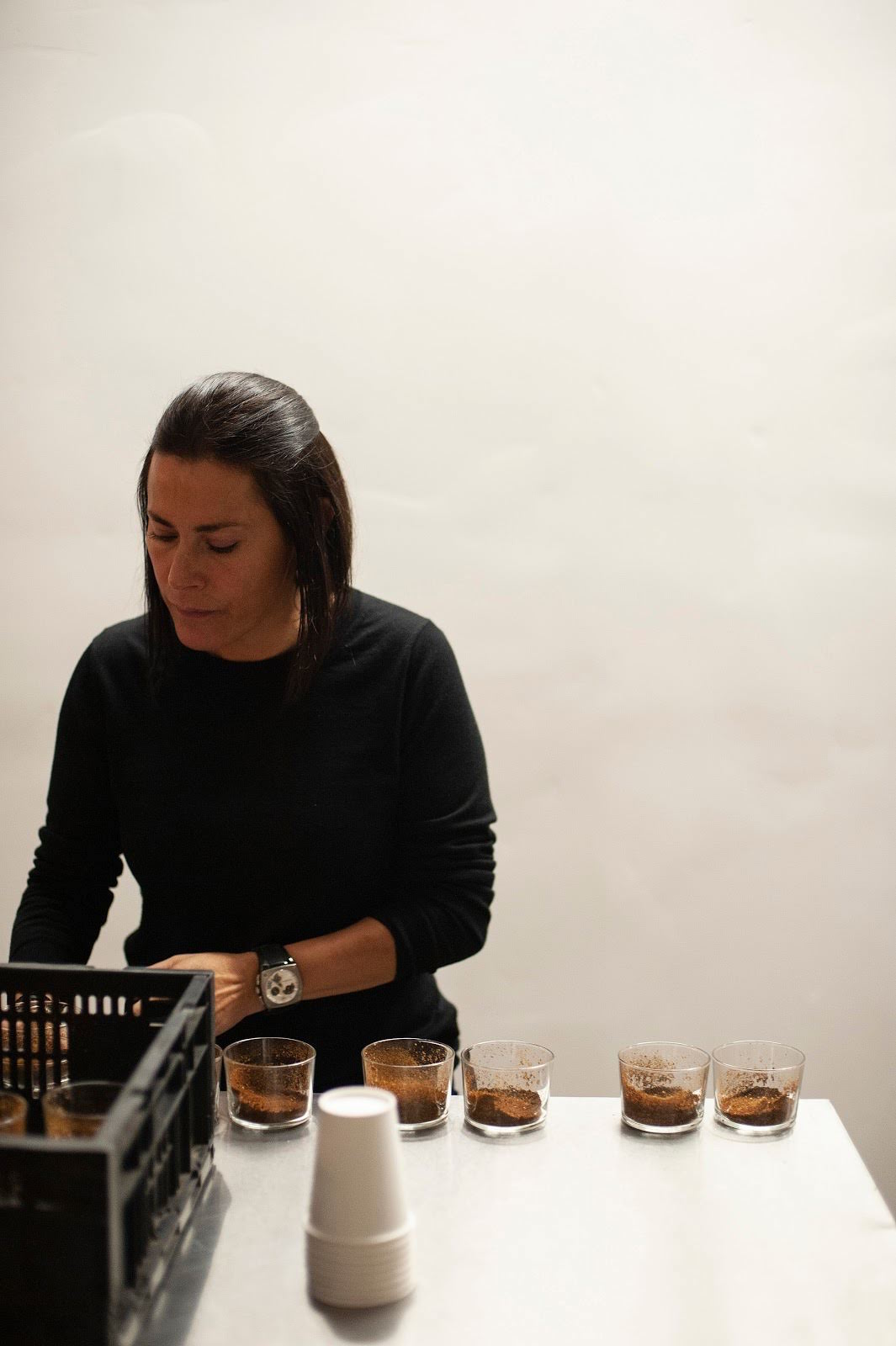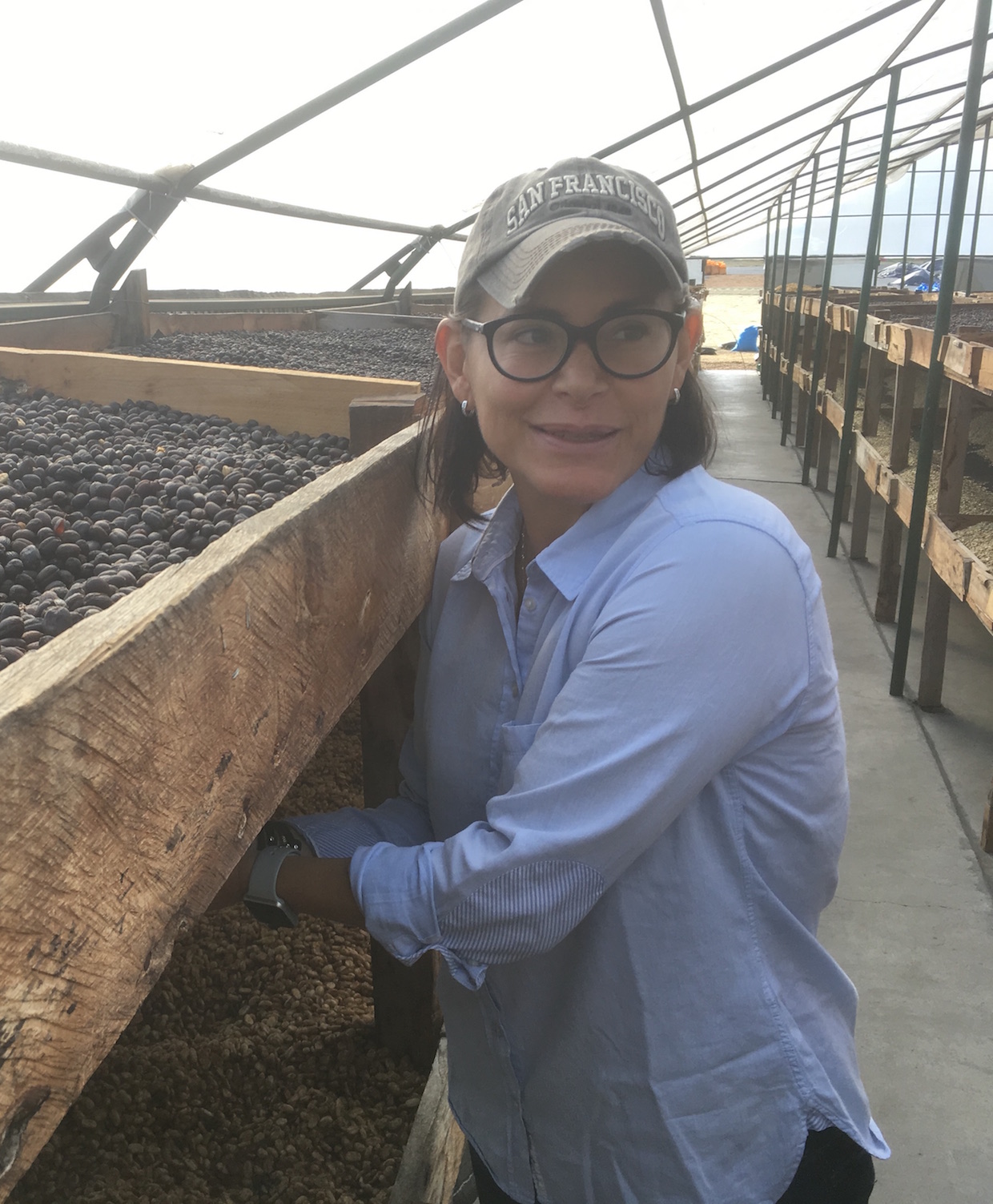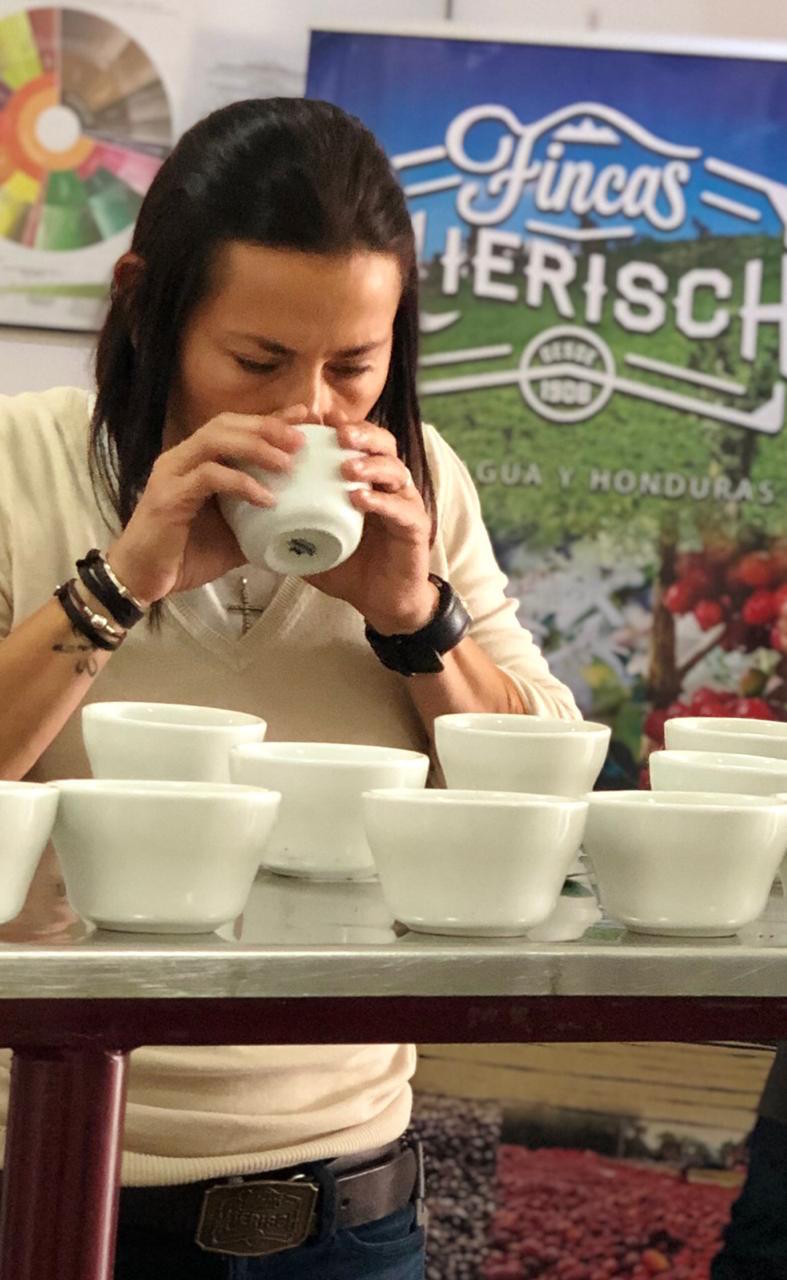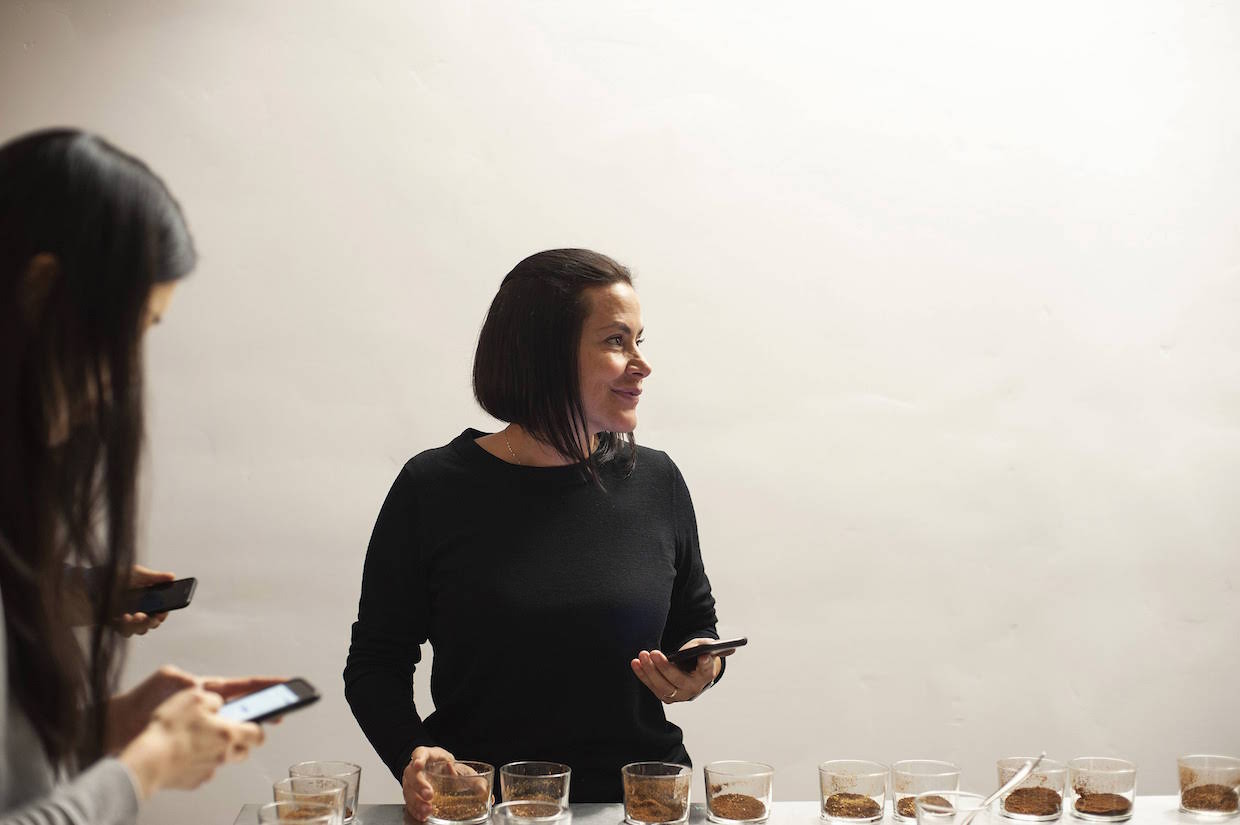
Eleane Mierisch, one of the featured coffee producer guests at the upcoming Women in Coffee Project panel discussion in New York. Courtesy photo.
(Editor’s note: This is the first in a series of profiles of women taking part in the inaugural Women in Coffee Project panel event coming to New York this April.)
In October 2018, I founded the Women in Coffee Project, an organization promoting gender equity in the coffee industry.
I have been a coffee professional for many years, with much of the past five being largely devoted to roasting. For me, being a coffee roaster means embracing the experience of not knowing what you don’t know — it may sound strange, but I hope other coffee roasters can empathize with this.
As roasters, we are constantly seeking solutions, collecting data and looking back on roasts to test our theories and methods. This kind of discovery process can be challenging and uncomfortable, but I don’t believe it is exclusive to roasters. People throughout the coffee industry are constantly challenging themselves to learn and discover more, yet too often these pursuits are insular in nature. I believe the best path toward growth and knowledge is paved with compassion, understanding and the willingness to listen to the perspectives of others.
I am not the first person in coffee to come to the conclusion that we must rely not only on our immediate communities, but on direct voices in our supply chains, to come to a greater understanding of the social, cultural, political, economic, and international complexities surrounding issues of gender equity and social justice in our field.
Even so, over the past couple of years, when I started searching for context surrounding the experiences of women in coffee-growing regions, I didn’t know exactly which data to trust, or whom to turn to for more information.
Though I have since met incredible and hard-working individuals and organizations focusing on different aspects of empowering women — many of whom have been generous with me with their time and advice — I have nonetheless been struck by how often the stories of women in coffee-producing countries are filtered by others.
So I decided to create a space in which to highlight the voices of the women themselves — a place where they can share their own experiences, in their own words. Through WhatsApp, Instagram and other readily available channels, the Women in Coffee Project has been relying on social media to help bridge the gap between consuming and producing countries and give all of us the chance to see, hear, and speak to one another more directly.
In addition to raising funds for other organizations working on measurable efforts to empower women on coffee, our major annual goal is to raise funds to invite a panel of women representing different areas of leadership to speak in New York.
The goal of all of our events is to celebrate the work of women working in coffee-producing countries. But beyond that, we hope to encourage awareness of gender equity efforts, identify differences between equity and equality, and also to create a safe space to talk about how and where we can advocate change from different positions across the coffee supply chain.
For this Women’s History Month, we have been co-hosting a series of tastings every Friday evening in March at Pulley Collective in Red Hook, Brooklyn. The coffees we are tasting are produced or influenced by women, and presented by a range of importers, roasters, and specialty coffee companies in the Northeast. We are also hosting a Book Club in order to learn more about the culture and female authors in coffee-producing countries (our first country is Rwanda), a screening of the Gender in Coffee documentary in conjunction with a Q&A with Kimberly Easson of the Partnership for Gender Equity.
We’re also thrilled to be hosting our inaugural panel event this April in New York. Today, I’m thrilled to feature one of the speakers from that, Eleane Mierisch.
Amaris Gutierrez-Ray: Hola Eleane! What’s your title? How long have you worked in your role? And how did you get into coffee? (This is like a mini mini bio!)
Eleane Mierisch: Our family has been farming coffee for five generations. I spent my early childhood in Nicaragua, and we later moved to Texas where I followed my father’s footsteps and became an OB/GYN Nurse Practitioner. I remained in Austin when my family returned to Nicaragua, but ultimately came home to be with my mother before she passed away. My brother inspired me to leave medicine and join the family venture of farming, where I have been full-time for the last 15 years. My apprenticeship began by learning the supply chain: from cultivation, harvest, processing and preparation to cupping. As the Director of Beneficio Don Esteban, my daily focus is on quality control, preparations, and client relations. And last but not least I’m head judge for Cup of Excellence. This brings a smile to my face, as it makes me realize once again that coffee is my passion.
AGR: What are your personal goals for yourself in your career? What about just the immediate goals for the next year now that harvest in Nicaragua is dying down? What about 10 years from now?
EM: The near future, this year, next year, the year after that… That’s where my head is right now. Nicaragua is going through a hard time, and we’ve chosen to presently be more conservative in our decision making. We’ve shifted our focus to mapping out and creating efficiencies, taking a critical look at operations. Each year, after harvest peaks and preparation comes to a close, and the majority of the coffee has been sold and exported, we shift our focus to agronomical work and input at the farm level. It’s an annual cycle. This year we are definitely looking at ways to create more efficiencies at the farm level by improving our data collection and farm analyses to maximize the efficacy of agronomic applications. Ten years from now, I hope the farms are still thriving, that our team is still with us thriving themselves, and that Nicaragua as a country is in a place which fosters a vibrant, environmentally progressive coffee economy. It’s impossible to think about the future without thinking about climate change, but that’s another conversation.
AGR: Tell us about some women who have given you inspiration in your work and your life.
EM: My mother. She led with enormous generosity, honesty and kindness — a pillar at home; a great example [of] a coffee-working woman during times that gender inequality in Nicaragua was a living reality.
Professionally, I am inspired by my dear friend Susie Spindler, one of the founding members of Alliance for Coffee Excellence and Cup of Excellence. Susie’s work has always been equally guided by a strong moral compass and a focus on laying the groundwork for a resilient, equitable, and quality-driven supply chain.
AGR: Have you encountered any obstacles in your work with anyone because of your gender? Did you come up with any personal solutions in those instances, if any? Or, knowing you, did you find a way to speak about them candidly?
EM: I feel privileged to be in a position where I feel that I can speak about my obstacles in work and life openly. It’s important to remember that not every person has the agency, leverage, or security to do so. Many people who speak out and stand up for themselves may be, and are very likely, taking a risk. I hope that by sharing my experience, I create more of a safe space for others to do so as well — show my support, or at least be someone who can shed light on some of the obstacles too many of us face. Coffee in Latin America skews to a macho culture, but I run a beneficio where a lot of workers are women, a majority of leadership positions are led by women at Beneficio Don Esteban, and I run a farm in a position that is traditionally held by a man. And this is not because we are women, but rather our preparation and essence that pushes and motivates us to be leaders and better manage homogeneity. All this fills me with pride.
AGR: If someone were to ask you “Why should we talk about women in coffee?” what would you say?
EM: Why wouldn’t we talk about the labor force in coffee? Specifically in coffee, it has been more of a challenge to take our much-deserved place. But today more and more women are managing their role within the coffee industry. Every day we have taken our place as enterprising women and we are capable of reaching our goals and practice our passion, whatever they may be. And every day more women are involved in leadership positions in the coffee industry. We must talk about women in coffee because from their first steps — picking coffee — women do a better job with finesse and great dedication. This has been my experience. Also, many of these women are the the bread-winners for their household. It is also important to recognize that more women have taken leadership roles. I am pleased to encounter worldwide more women in different leadership positions. I’ve had the privilege to learn from women diverse topics in coffee.
AGR: Since we are looking to build new systems to talk about supporting women in coffee, and you have spent a lot of time doing that, what advice would you give us? If we wanted to do something totally new, should we pay attention to how to do that respectfully? Should we focus on giving help or priority toward education here? What are ways to empower women, or to give them more power in their lives and work?
EM: Representation matters. We hire women throughout our company and promote women into leadership positions. It is key to remember that what people want is autonomy, and economic agency — a.k.a. a good paycheck that provides that to at least a large degree. The rest is cultural. Normalizing and supporting women in the workplace, including women in leadership positions, is the first step, and begins with hiring practices.
Once women are hired, it is imperative to create environments where women can succeed. This includes fostering neutrality, equitable expectations and pay, clear and transparent pathways to personal and collective success, and cultivating a workplace where mutual respect is standard practice, which starts from the top down. I think it is always important to not take the stance of saviorism, and to heed caution to words such as “empowerment” and “giving help.” People will help themselves if given the chance, the agency, the education, and the capital. It’s our job as company and industry leaders to create truly equitable workplaces and simultaneously dismantle the nuanced, biased systems where the success of certain privilege demographics is favored.
AGR: If you could go tomorrow to another coffee-producing country to see something, what country would it be and why?
EM: Ethiopia. We do a lot of experimentation with varieties from the region. I would personally love to learn more about the varietal research, farming tradition, and cultivation there.
AGR: We know you have spent a considerable amount of time and energy on building a strong team. Could you tell us more about that work? How do you all work together and how do you give them support? How do you function as an organization of people, both within and apart from the harvest times?
EM: Beyond my response the question about supporting women in the industry:
Fincas Mierisch is truly a family operation. We have an open door policy where anyone can come to myself or my father when they need support. We are all close, we all care about each other, and we have each others’ back. Each of my team members is supportive of Fincas Mierisch. We wouldn’t be successful otherwise, so we have to reciprocate. If we don’t, we aren’t sustainable. Everyone knows that each harvest season we all have to give it our all. We’re all proud when the coffees taste great, everyone is excited to be a part of the company’s success, we share the success, and we let our team know that we’re grateful for their commitment and hard work, and that we couldn’t do it without them. We have to all be focused on the same goal, which is ultimately creating and providing stellar coffees.
After the harvest, I include my team in a dialogue for planning the next year building on successes, but more importantly, learning from mistakes and areas of weaknesses. We also do a basic cupping training at each farm. This includes tasting a good coffee, an astringent coffee and a fermented coffee. This has help us better explain the great importance to pick only coffee that is at its optimal ripeness.
AGR: What’s the first thing you want to eat when you get to New York? Bagels? Pizza? European cheese?
EM: Oysters, European cheese and Champagne.
Amaris Gutierrez-Ray
Amaris Gutierrez-Ray is the Roasting Operations Manager for Joe Coffee Company in New York City. She is also the founder of the Northeast Roaster Forum and the Women in Coffee Project. A lover of stories and the people that tell them, she has always been interested primarily in the culture and communities of this world in coffee.
Comment
2 Comments
Comments are closed.









Good article.
My name is Dennis Dran. I am retired from Mother Parkers. I had the pleasure of cupping with Eleane, and her wonderful team, when she judged the Los Cafés Más Finos de Nicaragua international competition a few years ago. The event was managed in a very professional manner and was wonderfully educational as well. I developed a deep appreciation for Nicaraguan coffee and the unique solutions Nicaragua has employed in continuing to adapt to the challenges of producing such enjoyable coffee. I am happy to hear of Eleane’s continuing passion, achievements, and her work in helping us realize and appreciate the many essential roles of women throughout the coffee industry, without whom we would not have such wonderful coffee. I wish her well!